First-time filmmaker shares how her greatest trials led to her best stories

JUNEAU, Alaska — Angela Williams has endured many trials, from grappling with identity to addiction, even a cancer diagnosis. And while these challenges vary, they share one important commonality — Williams has used them to help her fulfill her dream of becoming a storyteller. Through this, she’s able to reach out to others like her who felt alone, and let them know that they’re cared for and understood.
In “The Lost Lingít,” her debut short film In her debut short film released in partnership with Native Lens, Williams summarizes her life through heartfelt narrations, gorgeous shots of life in Haines, Alaska, and heartwarming family photos from her past. She shares her experience with a childhood rich in culture, and the hard decision she made to leave the familiar and start anew in Juneau.
Rocky Mountain PBS touched base with Williams to learn what inspired her film, and check in on how things have gone since its completion. The conversation was edited for length and clarity.
Rocky Mountain PBS: Let’s walk through your timeline, starting with your childhood. Can you tell me a little bit of the culture and practices of your tribe?
Angela Williams: So I am Lingít, I also am Yupik, but I practice more of the Lingít heritage because that was my dad's thing and that's what's in Haines, which is where I grew up. My dad was the one who instilled all of the traditions, whether they were actual Lingít traditions or ones that have come up through the family through the years.
One of the biggest ones was Hooligan fishing, and the whole process of doing that. From what I understand, there's only a couple rivers that hooligan actually run.
The whole process is very cultural, and it's one of those community things. Everybody gathers there, and all the elders sit around the fire while the younger ones go and retrieve everything. Then you make the oil.
That's a big process. You bury all the hooligan in the pit and you let it sit there until it starts fermenting. Then you dig it all out and cook it, and you retrieve the oil off the top of a huge, big barrel.
In recent years, my family and just a couple other families were the last families that were still doing the whole entire process.
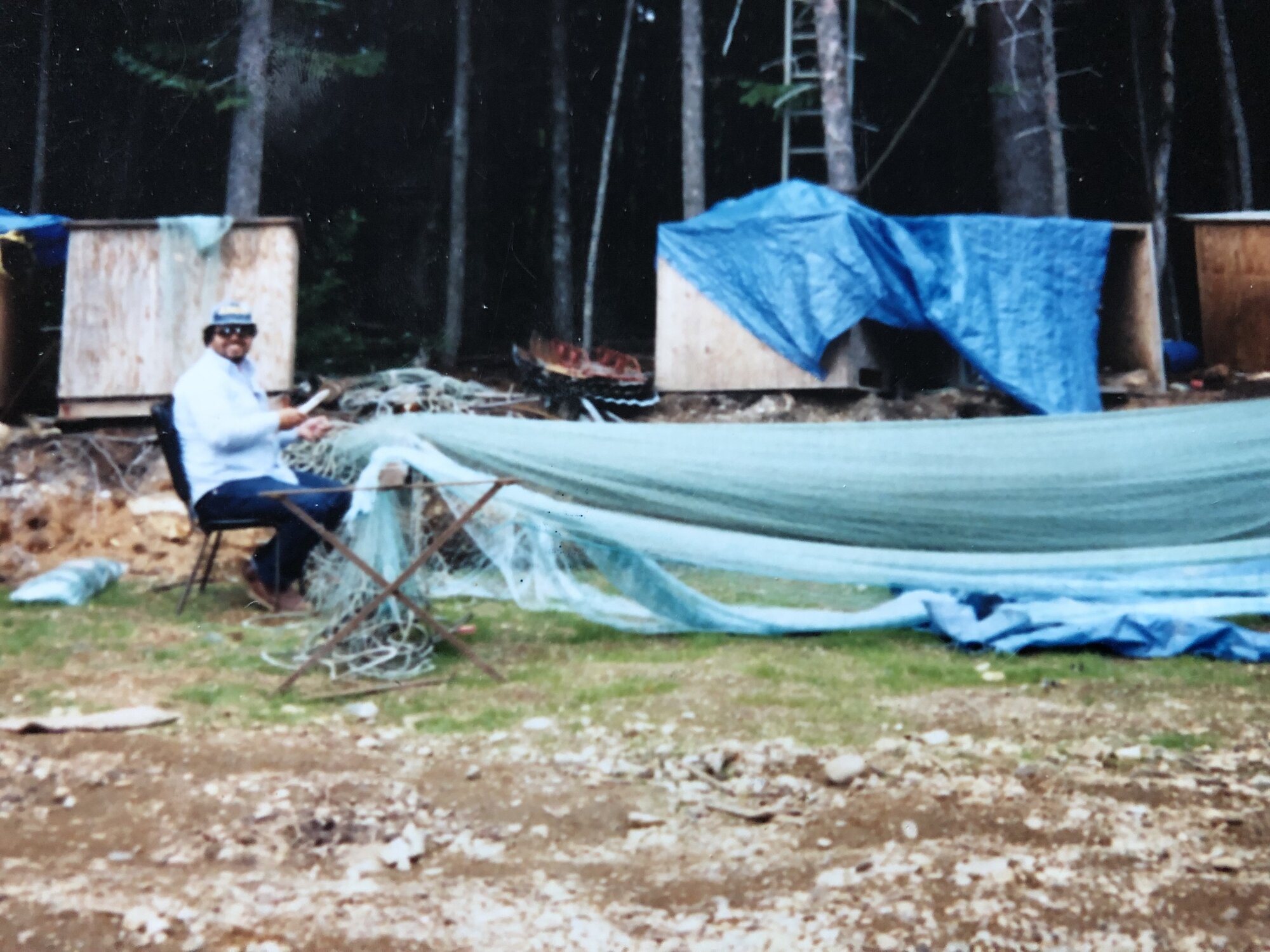
Williams' father, who taught Williams and her brother Lingit practices throughout their upbringing.
Photo: Angela Williams
My dad also commercial fished, and so if we weren't doing that, we were doing something cultural. He was always telling us stories, so many stories. In the beginning, in the spring, we would do crab digs.
The night before that, my dad would do funny things like beat on the drum or do a crab dance, sing songs, things like that.
RMPBS: What kind of community connections did you see happen through that process?
AW: It brought out the community, a lot of kids - and not just Indigenous.
Everybody was coming and joining in. And in the recent years there was a culture camp at Chilkoot by the river, and they actually hadn't done anything with it in a long time.
They started rebuilding it and my dad was part of it, so they were doing the hooligan tradition out there.
They were reviving the culture camp, and it was open to anybody. It wasn't just Indigenous. For whatever reason that one thing sparked everything.
RMPBS: Why do you think it was so important for your dad to pass on these traditions to you?
AW: Because throughout the years, he saw it dying. Kids weren't learning as much and people just weren't talking about it. People were starting to adapt to the newer way of life. So I think he just found it very important.
I don't know if he actually realized at first until later on when he started seeing me and my brother doing all those things that he taught, that he realized that he had done that.
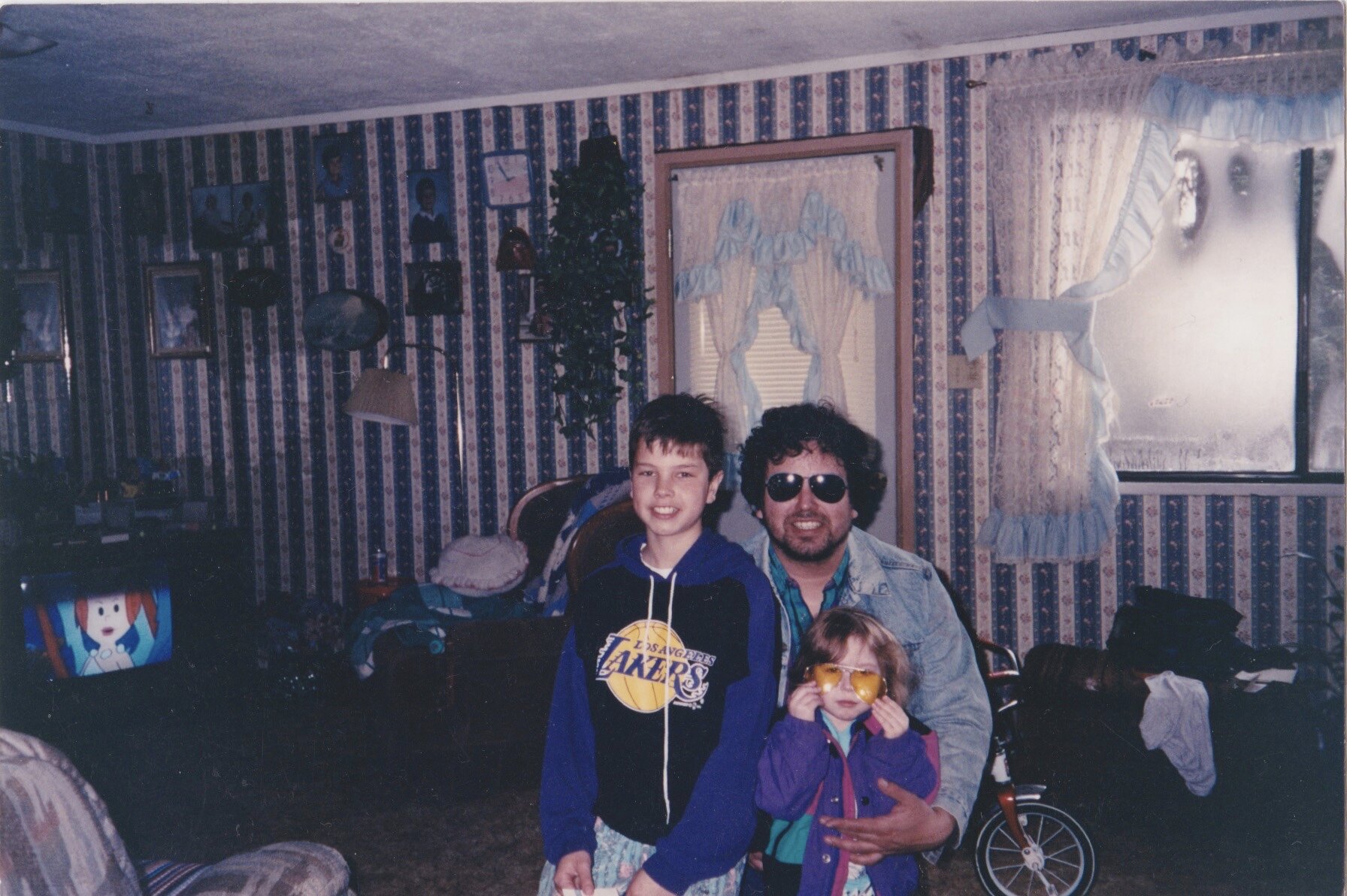
Williams trying on her father's sunglasses alongside her father and brother.
Photo: Angela Williams
RMPBS: Let's dig into the story element more. You said that you had always wanted to share your story. Tell us about some things that influenced that passion.
AW: By the time I was 16 or 18, I had already known that I had gone through a lot. I kept thinking that I could be a voice for others because I didn't feel like anybody else knew what I was going through. There was nobody else there.
Then growing up with my dad always telling stories, it infused that thought: I need to share my story. I wanted to be there for somebody because I didn't feel like I had anybody there for me.
RMPBS: In the film, you said your passion for storytelling led you to filmmaking. Tell me a little bit about that process.
AW: So for years and years and years I tried to write it out. It looked good, it sounded good, but it just didn't connect with me. I just kept going, “what can I do?” I saw a short little documentary or something and it was about an Indigenous person and I was like, “Oh, that's a really good idea.”
I could do film! I could tell my story through film that would get so many other people rather than books. People don't read books anymore.
I think it was a couple days later an ad for L.A. Film School popped up. The next thing I knew, I had joined film school.
RMPBS: How does it feel to be getting your first film out there after all this build up?
AW: The process is really exciting. But you have to have patience. You don't want to put it into the wrong hands or on the wrong platform.
RMPBS: You're sharing so much personal stuff in your film. What was your emotional journey during the filmmaking process?
AW: It was very emotional. Even though I don't say a whole lot of things, even just getting the little bits out and having to revisit all that past just to write that one sentence can be way harder than people think.
RMPBS: In the film, you made the tough decision to leave Haines. How did you know that it was time to move?
AW: A lot happened. I had been in a really bad relationship for about four years, and it only got worse. At the peak point of it, I tried to commit suicide. I was almost successful, and ended up in the hospital. For whatever reason, when I woke up and I was coherent and I remember calling my mom and being like, “I can't do this anymore. This is not how I want to live. I want to live. I do not want to die.”
That was a lightbulb moment. I wanted to get out of Haines, get away from everybody that doubted me. Not necessarily get away from my past, but take a break from it.
I called my best friend who lived in Juneau, told her everything, and she was like, Why don't you come down to visit for a little bit? So I came down and stayed with her and she talked me into staying a little bit longer, and then the next thing I knew, I was moving.
RMPBS: How did day-to-day life in Juneau differ from Haines?
AW: In Haines, I had the luxury of seeing my family all the time. My mom and dad, my brother, my best friends, my cousins. And we went out on the boat all the time. I've always loved being on the water. Then moving to Juneau, I didn't have any of that. I was basically on my own and starting over, going from small town to the city life.
RMPBS: Once you got there and you started to feel settled in, what were some changes that occurred?
AW: I started healing. I started finding myself spending more time by myself. Before I was always surrounding myself with people and things. I could never stand being alone for very long. That's when you start thinking of all the horrible things.
When I moved, I started finding that I was going for drives by myself and I was enjoying it. I was enjoying thinking, and I wasn't freaking out. Every time I would think about something bad that had happened before, I was working through it like, “Well, that wasn't really my fault. And you need to stop blaming yourself because that was five years ago.” I started a self-love healing journey.
RMPBS: Looking back, do you have a message you would give like your 16 year old self?
AW: Just keep pushing forward. There is a light at the end of the tunnel, and you will get there.
RMPBS: Now that you have shared your first film, what's next?
AW: I graduated in September of last year and my dad actually passed this year in May. He was diagnosed in January with Glioblastoma and that kind of just put a pause on everything.
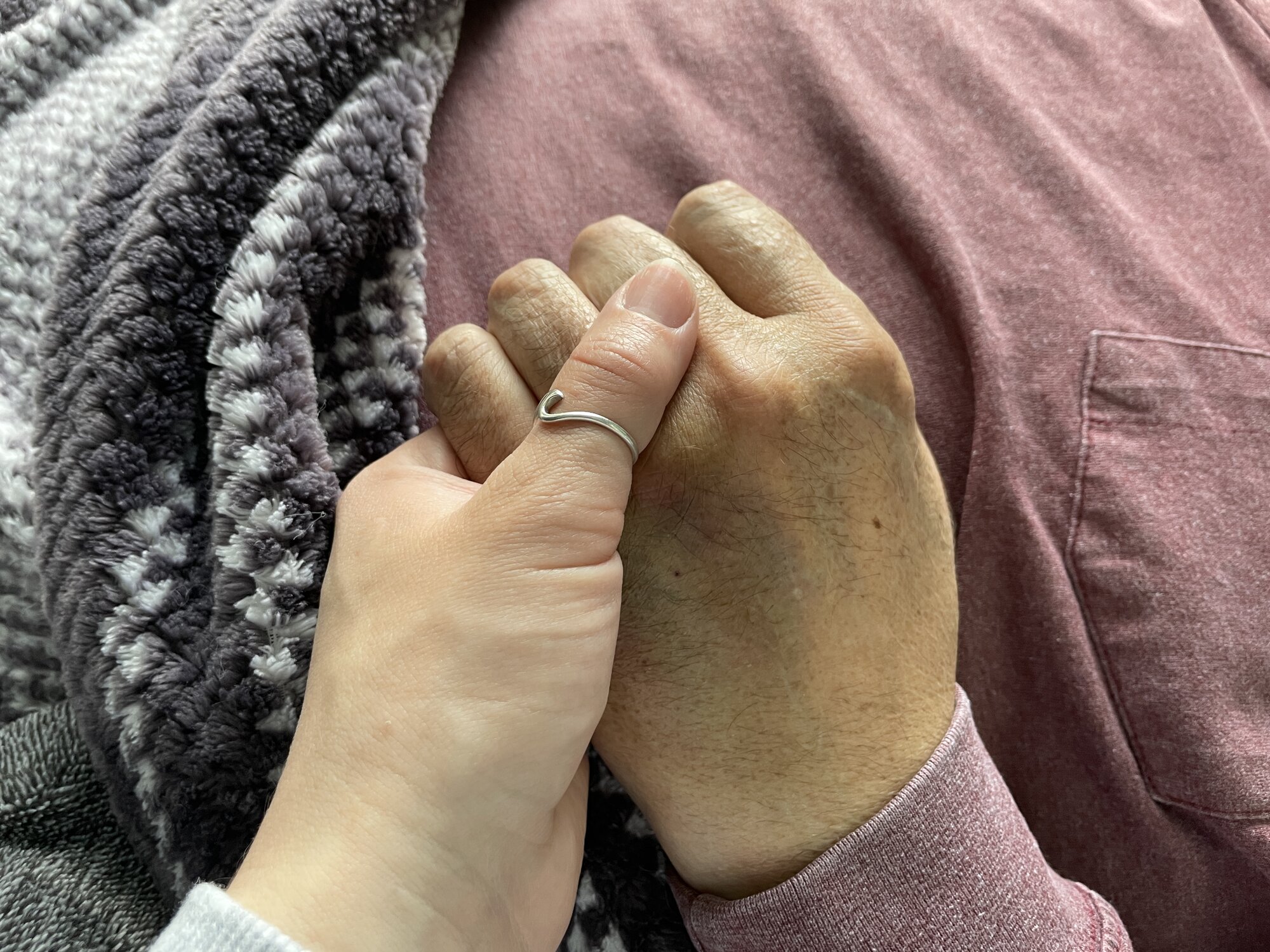
Williams saying goodbye to her father.
Photo: Angela Williams
Every time I would try to do something, I would just put it back down. I couldn't because all of my culture and my filmmaking, my storytelling, my stories, they all involve my dad. I wasn't ready to look back on those things, even though they're happy. It was just too hard.
RMPBS: Were you able to connect with family during that time?
AW: Yes. I recently took his ashes back up to Haines and we scattered it and it felt like he was there.
I had the majority of his ashes here in Juneau.All these different weird little things would happen, and when I took him home, it felt like I would I could look over and he was going to be right there.
He had a thing for little insects, like blow flies. Blow flies would just like come and just sit next to him. It was the strangest thing. I thought my mom was making jokes or something until I actually saw it. After he passed, all these blow flies kept pestering me.
The whole ferry ride up, there was this blow fly that sat with me. It sat with me the whole ferry ride. He would move from the rail to my foot, back to the rail. And I'm like, okay, this does not happen.
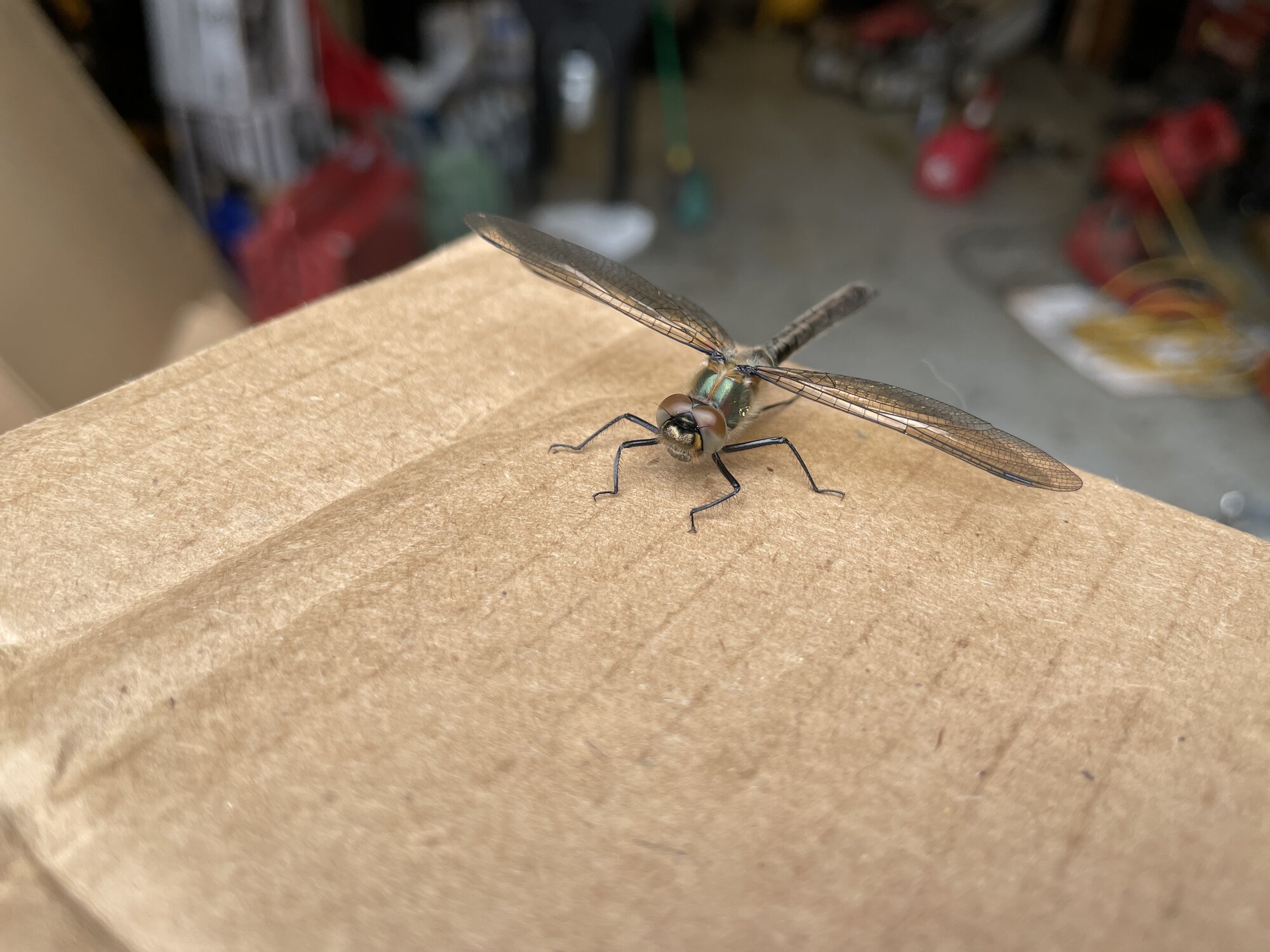
Williams' father had an affinity for insects. When the bugs visit Williams, she considers it a visit from her dad.
Photo: Angela Williams
RMPBS: Did you talk to your father about your desire to become a filmmaker?
AW: He followed all of it. He was always calling and telling me different ideas that he had for films that I could do. And they were always cultural. He really wanted me to catch the process of the whole hooligan thing and so I'm still thinking about doing that.
The only thing that sucks is that I don't have him to interview. But he was very proud.
RMPBS: It sounds like he was super connected to nature. That seems to be something you're carrying on. How do you interact with nature?
AW: Very spiritually. And I didn't realize I had done done that until after he passed. My mom always tells me, “You and your dad are something. You're connected in a very, very unique way.”.
When he got sick and he was always complaining about headaches, he would tell her how bad his head hurt. And then I would call her and be like, “Oh, man, I have the worst headache today.”
RMPBS: Your cervical cancer diagnosis made you worry about whether you would be able to pass on your teachings and heritage. Tell me any conclusions you reached or ways that you found around that.
AW: It was really hard at first realizing and I guess I didn't even realize it until I started the process of making the film. I was like, “Wow, I really am not going to be able to pass on my genes or my heritage.” It was kind of hard, but it still needs to be passed on.
I think the biggest way that I could do that would just be to tell anybody who listens with films or script writing
I do have a niece and she looks a lot like me. So there is a way to pass some things on.
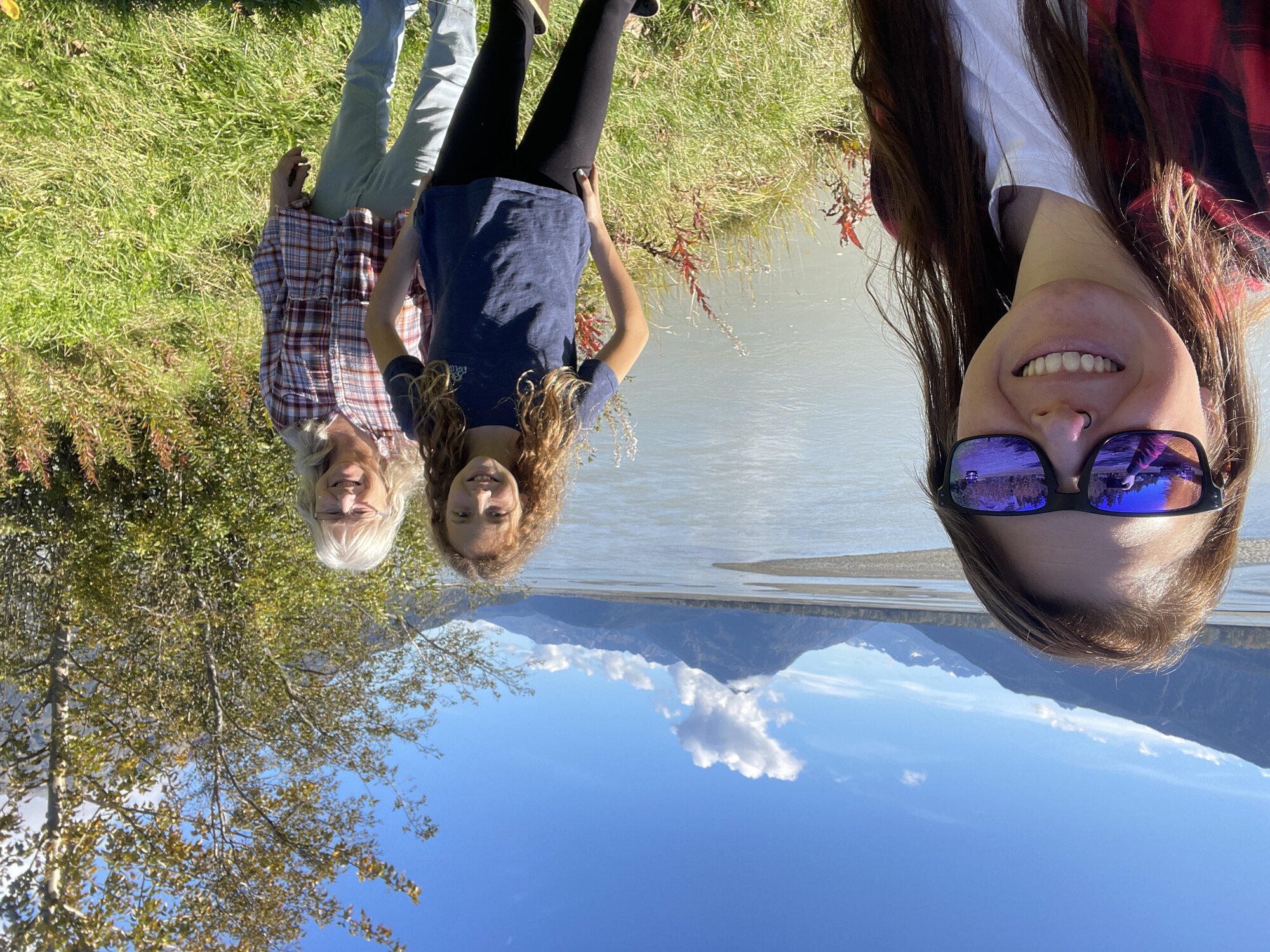
Williams, her mother and her niece.
Photo: Angela Williams
RMPBS: You have a stepson as well. Do you pass on any of the traditions to him?
AW: Yeah, we're very close. He loves listening to my stories and learning traditions.
It breaks my heart because he has asked me before whether he is Native in any way. And I'm like, “I don't think so. That's okay. You can still do all the things that I teach you. There's no reason you can't. It's better that it's passed on than not.”
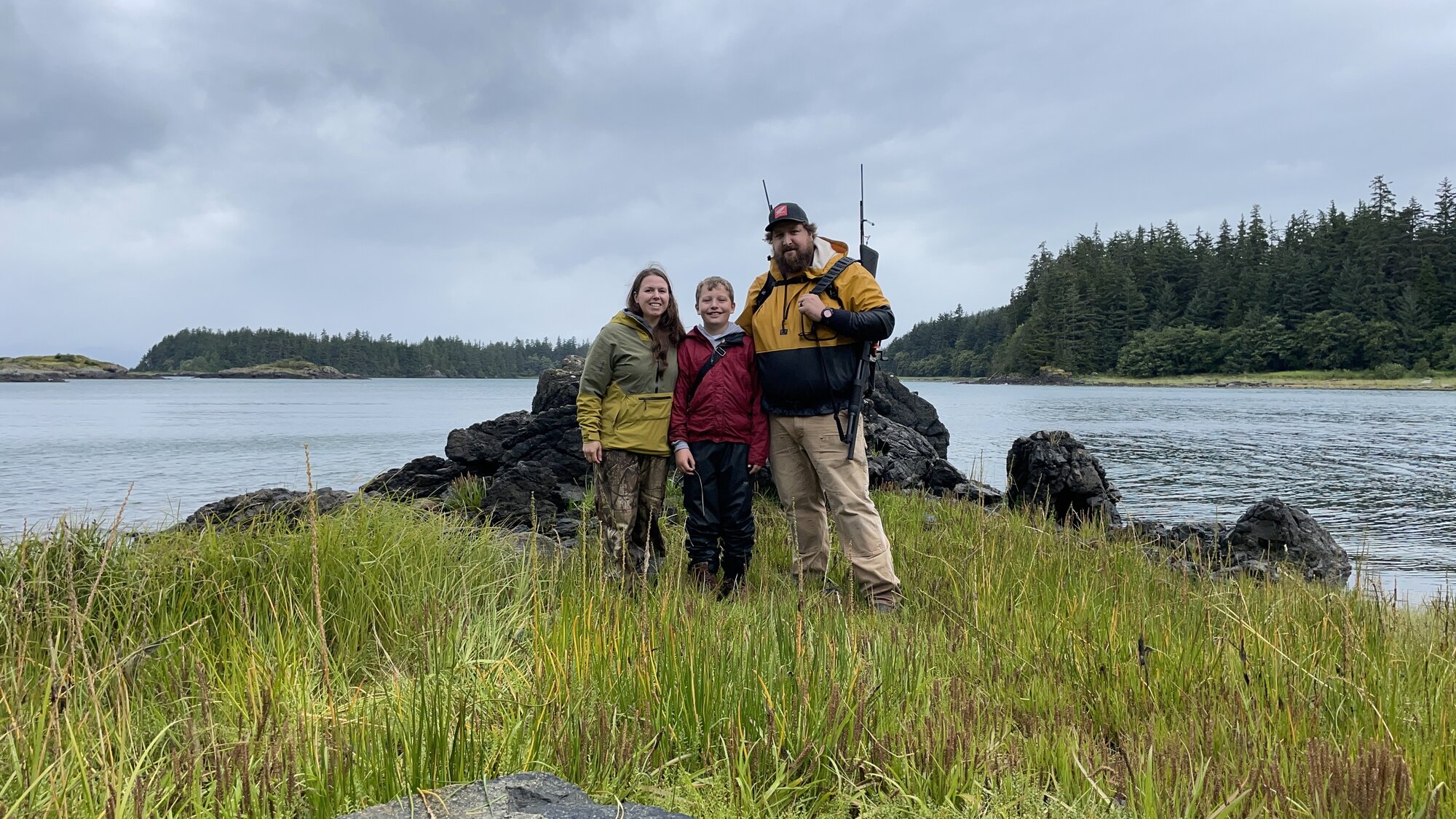
Williams, her husband and her stepson. Williams says her stepson loves learning Tribal traditions and stories.
Photo: Angela Williams
RMPBS: You mentioned that you get questioned a lot as a “white-passing” Native. It sounds like you're kind of stuck between two worlds in that sense. Can you tell me a little bit about your experience with that and how you cope with it?
AW: It's still a coping thing.
Some days I feel like I don't need somebody else to tell me that I’m Native in order to feel it. And then other days I find myself like, Well, what could I do to appear more so people will accept me for what I am, for what truly what I am?
I think telling my stories and stuff is how I find comfort because I know there's lots of people out there who feel the same exact way. It's kind of sad because whenever I'm trying to find Indigenous documentaries or anything like that, it's really hard to find light skinned, fair skinned, anything. So there's not a whole lot out there to make people feel comfortable and who they are.
RMPBS: What do you hope people garner from watching your film?
AW: That they're not alone. That there's someone out there that feels just the way they do, whether it has to do with cervical cancer or having a hard childhood or reconnecting with their culture or being light-skinned Indigenous…all sorts of different things. I feel like that's something that I'll want to carry in all the films.
Elle Naef is the multimedia producer for Rocky Mountain PBS. You can reach Elle at ellenaef@rmpbs.org.
